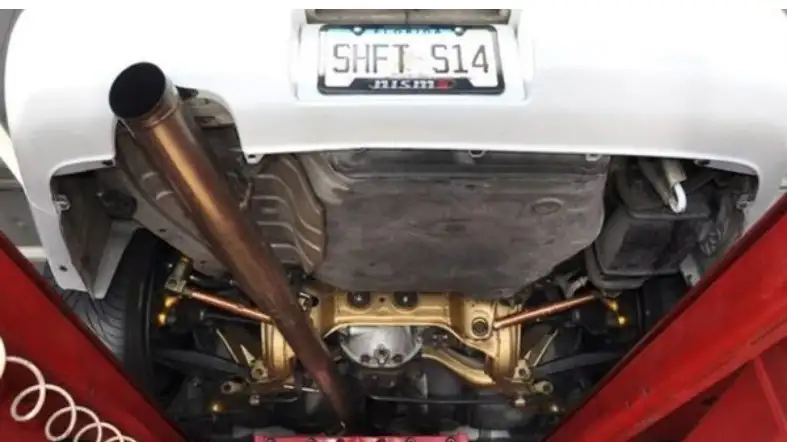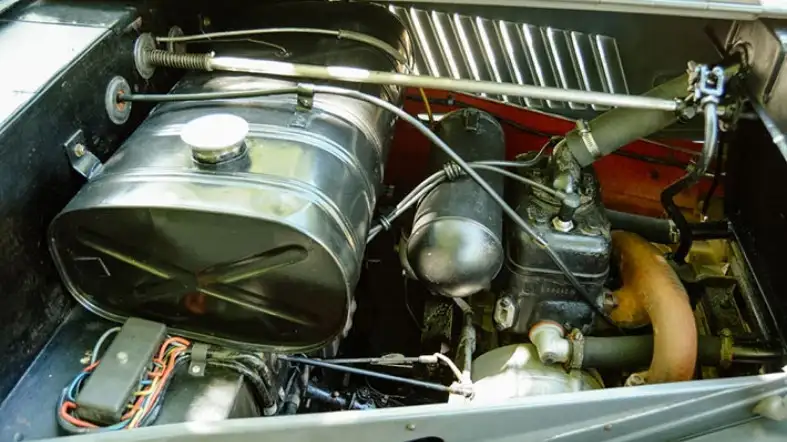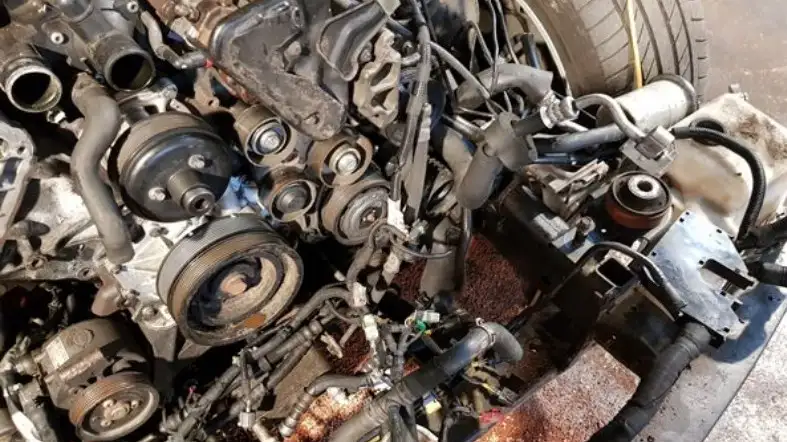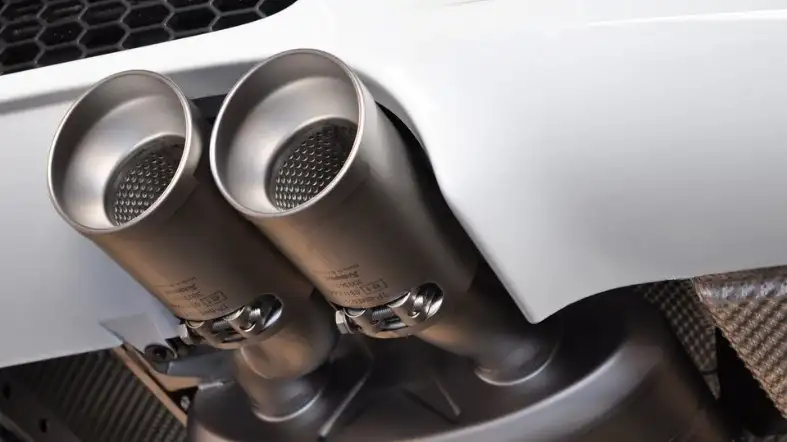Debates among car enthusiasts rage on: Are straight pipes detrimental to your engine?
This article explores the pros and cons of straight pipe exhaust systems, their effects on engine performance, and potential long-term risks.
Whether you seek a power boost or just want to understand the consequences, read on for valuable insights into this contentious modification.

Is Straight Pipe Bad For Your Engine?
No, straight piping itself won’t harm your engine, but it can lead to increased emissions, noise, and potential legal issues, while also affecting engine performance if not done correctly.
Common Myths About Straight Pipes
let’s clear up some common misconceptions that people have about them.

Performance Enhancement Fallacy
Another highly popular reason for straight piping in automobiles is to enhance engine power.
They hold the opinion that, by allowing the exhaust to flow freely, they will get more horsepower and torque.
Nevertheless, this may not always be the case. If the kind is small or your engine is small, straight piping may even lower your performance.
Your engine also requires a certain amount of back pressure to run smoothly and to maintain an appropriate ratio of air and fuel.
If you lower the back pressure too much, you will risk low-end torque and fuel economy losses and cause your engines to run lean or rich.
This can damage your engine components and sensors in the long run.
Universal Legality Misconception
Some people straight pipe their cars to make them sound more aggressive and sporty.
These people believe that they can drive their cars with a straight pipe since they pass the emissions test.
But in most states, this is not the case. The fact is that most states have rules specifying the sound level at which one can drive on public roads.
You can be fined or get ticketed by the law if the straight pipe exhaust system surpasses these limits.
In some states, straight piping your car is even against the law, or so is the removal of the catalytic converter or muffler.
Before you modify your exhaust system, always check your local laws.
Always Louder Assumption
There is no assurance that your car will be loud when using a straight pipe exhaust system. The factors affecting it are pipe diameter, length, exhaust tip size, and engine condition.
There are instances when a straight pipe will not only increase volume but even make your car quieter.
For example, a small engine with a large pipe may lower sound, while a large engine with a small pipe could increase sound. However, straight pipes do not exhaust noise alone.
Fuel Efficiency Misunderstanding
Some people think a straight pipe exhaust system is lighter and therefore more fuel efficient. Though it reduces weight by discarding some parts, it does not affect fuel consumption much.
However, the weight reduction caused by the larger pipes and tips may be offset by more drag.
Besides, using a straight pipe upsets the air-fuel ratio, resulting in poor fuel efficiency and increased emissions.
Unchanging Emissions Belief
Some folks think that if they test below the limit, it means there is no effect on emissions when a straight pipe exhaust is installed.
This is incorrect. The catalyst, which is an important component in reducing emissions, is stripped off through a straight-pipe setup.
The converter converts pollutants into less hazardous materials, thus meeting governmental environmental standards.
You release more pollutants when this is not included, hence global warming and smog. Keep your catalytic converter for a greener world!
Maintenance-Free Fantasy
That is a notion held by some people, who contend that straight piped exhausts have fewer parts, making them low maintenance.
It might need more TLC as it puts extra strain on your engine. It can wreck these, including performance, gas mileage, emissions, sensors, and parts.
There are more tune-ups to expect, frequent changes to the spark plug and oxygen sensor, leak checks to be carried out, and a constant check on the engine temperature.
Universal Fit Mistake
There is nothing easy about a straight pipe exhaust system for all cars. Cars may vary in engines, size, and shape.
Therefore, some adjustments like cutting, bending, and welding may be required.
The pipes might also need to be modified by the contractors, new gaskets might be required, and the cables could also be moved for the right fit and to prevent damage due to heat and vibration.
Benefits of Straight Pipe Exhaust Systems
Let’s look at some of the benefits that they can offer.

Enhanced Engine Performance
By removing this restriction, your engine’s flow is enhanced, and the improved exhaust flow of a straight pipe exhaust system will boost your engine’s performance.
This scavenging effect creates a vacuum that sucks in more air and fuel in the absence of restrictions.
This leads to an increase in horsepower and torque at high RPMs, resulting in enhanced acceleration and speed.
This is of particular importance for turbocharged or supercharged engines that generate maximum performance by using high exhaust pressure.
Aggressive Sound Profile
A straight pipe exhaust system also has the advantage of producing a strong sound profile for your car.
In order to release the real sound of the engine, you can remove the muffler, resonator, and catalytic converter to make it louder and deeper.
This can give a satisfying driving experience and make your vehicle unique among others.
While it should be avoided making your car too loud or too annoying, as such may have legal and societal consequences.
Reduced Backpressure
A straight pipe exhaust system also reduces the backpressure in your engine, a third benefit. By the exhaust gases that try to get out of the engine.
Excessive backpressure can cause turbulence and heat in the cylinders thereby reducing your engine performance and efficiency.
The backpressure can be reduced with the straight pipe exhaust system since the exhaust gases have to exit the engine in a direct pathway.
This can help to bring down the temperature of your engine and improve your combustion process.
Potential Fuel Efficiency Improvements
A straight pipe exhaust system can also improve your fuel economy in some cases. With this, you can optimize your air-fuel ratio and burn less fuel for more power, reduce the backpressure, and enhance engine performance.
This can improve your fuel economy as well as reduce your expenses on gas.
Despite this, the advantage can not always be easily seen or reliable, since it depends on different things like your driving, road, engine, and weather.
Faster Turbo Spool Times
Make a turbocharged engine go faster using a straight pipe exhaust system. You get more power sooner, as it helps in the spin up of the turbocharger.
This is because it eases backpressure and makes the exhaust flow smoothly, thus the turbocharger operates well.
Aesthetically Pleasing Design
A straight pipe exhaust not only boosts performance but also adds a cool style to your car.
With features like a chrome finish, colored tips, and dual pipes, it gives your vehicle a sporty and customized look.
Optimized Airflow Dynamics
Using a straight pipe exhaust with equal-sized and length intakes and outlets enhances engine performance by creating a balanced airflow. This improves efficiency and helps the engine run better.
Potential Drawbacks of Straight Pipe Exhausts
Here are some potential drawbacks of straight pipe exhausts:

Legal Concerns
You may think straight pipe exhausts are cool, but they can burn you.
There are many locations with regulations about the amount of noise a vehicle can produce. Violating these noise regulations might attract a fine.
In fact, there are cities that have strict noise limits for vehicles and any violation of the limit can land you a fortune to pay.
Engine Damage Risks
Consider twice before taking off that muffler. A straight pipe may upset your engine. It’s not just for sound, it’s also for controlling pressure.
Without it, your engine would not be at its best. According to some studies, modified exhaust systems can increase the risk of engine damage by up to 20%.
Decreased Fuel Efficiency
However, your wallet might be lighter because of that big noise. You can decrease your fuel efficiency through straight pipe exhausts.
The EPA discovered that cars with modified exhaust systems can have their miles per gallon reduced by 2-5%.
Reduced Resale Value
Selling Your Vehicle? Be careful with those modifications. Most customers prefer cars in their natural state.
Mucking about with the exhaust system can decrease the resale value of your car by up to ten percent.
Noise Complaints
Your neighbors may not appreciate the noise your loud cars make. Too much noise may result in complaints, and no one wants to be the trouble causer.
More people are complaining about loud car exhausts, says a survey by the NIH.
Emission Regulation Non-Compliance
Noise is not the only issue; there are environmental concerns too. Vehicle emissions are governed in many places.
Your car may sound very mean with straight pipe exhausts, but the vehicle may also emit more pollutants. Fines and damage to the environment may be caused by breaking emissions.
Sensor Malfunctions
Your car is smarter than you know. nederbörd: These sensors make it run smoothly.
Such sensors might be thrown off if the exhaust system is tampered with, causing malfunctions.
According to the Journal of Automotive Engineering study, modified exhaust systems may result in up to 15% increase in the chances of sensor issues.
Although, straight pipe exhausts may give your car a growle, however, they have a number of drawbacks, before you do this kind of modification.
The cool factor can bring in legal troubles and engine risks, which might not be worth the headaches.
Signs Your Engine is Affected by Straight Piping
Here are the signs your engine is affected by straight piping:

Unusual Engine Noises
Therefore, you have your ride revved up, but what’s that weird noise? If your engine starts making a noise like a grouchy robot, chances are it is strait piped.
In straight pipes, the mufflers that usually quieten down the noise have been removed. Car experts have it that excessive noise causes engine stress and makes the engine work harder.
Decreased Performance
Is your car not moving as it used to? It could be straight piping.
Remember, the performance of your car depends on the right ratio of air and fuel. Mufflers help maintain this balance.
They are so dirty that even in their presence, your car may not perform as it is supposed to.
Mufflers or no mufflers can result in a 12% decrease in horsepower for a motor car, according to research!
Irregular Fuel Consumption
Let’s talk gas. You love driving, but it seems like your car is consuming fuel just as much.
Straight piping can throw off the fuel-to-air ratio, causing your engine to guzzle gas for no reason. It is indicated that cars without mufflers may consume an additional 10–20%.

Is It Okay To Drive With Check Engine Light On?
Frequent Overheating
Even engines, like us, can heat up after a workout. However, if your car is heating up often, straight piping can interfere with the cooling system.
Heat is not well removed by the engine without mufflers. Heat not Cool Serious Engine Damage!!
Check Engine Light Activation
Your car has a way of telling you that it’s unhappy, and that’s the check engine light.
If it starts up after the straight pipe installation, then it is not a good sign.
According to studies, straight piping interferes with a car’s emissions system, causing the check engine light to come on.
If it is left unaddressed, it can cause greater harm in the long term.
Vibrations During Acceleration
Isn’t that the best, smooth ride? Yet, if you have more vibration than usual during acceleration, you should blame it on straight piping.
Mufflers do not merely serve the purpose of noise reduction, but also that of reducing vibration. They make your car feel sturdy when you are on the road without them.
Excessive Exhaust Smoke
Finally, I will discuss smoke signals from your tailpipe. Your engine may be struggling and excessive exhaust smoke may be a sign of this.
According to studies, straight piping is able to disrupt the combustion process so that smoke is produced obviously.
Straight piping may give your car a roar, but it can also give your engine a grumble. If you notice any of these signs, keep an eye (and ear) out and your car may need a little TLC. Happy driving!
FAQs
Can straight piping cause check engine light activation?
Yes, straight piping can interfere with a car’s emissions system, causing the check engine light to come on.
Is straight piping recommended for vehicles driven on the road?
No, it’s not recommended for road use, as straight pipes often lack catalytic converters and can cause emissions test failures.
Does straight piping increase engine performance at low RPMs?
No, straight piping can lower performance at low RPMs by reducing back pressure, potentially causing issues.
Are straight pipe exhaust systems legal in areas with noise regulations?
No, in areas with strict noise limits, using a straight pipe exhaust system may result in fines.
Do straight pipes reduce a vehicle’s resale value?
Yes, modifying the exhaust system, like using straight pipes, can decrease a car’s resale value by up to ten percent.
Does straight piping affect the fuel-to-air ratio and fuel consumption?
Yes, straight piping can throw off the fuel-to-air ratio, leading to increased fuel consumption.
Can straight piping lead to more sensor malfunctions?
Yes, tampering with the exhaust system, such as using straight pipes, may increase the chances of sensor malfunctions by up to 15%.
Final words
The debate over straight pipe exhaust systems continues among car enthusiasts.
While they offer benefits like enhanced performance and aggressive sound, potential drawbacks include legal issues, engine risks, decreased fuel efficiency, reduced resale value, and noise complaints.
Before opting for straight pipes, consult with a mechanic to assess suitability.
Balancing performance gains with potential problems is essential for informed decision-making. Drive wisely.
